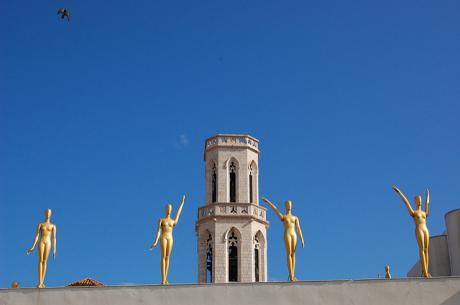
Figueres, Teatre-Museu Dali, Catalonia. Flickr/Ilya Bogin. Some rights reserved.Without claiming to represent anyone but myself, I wish to focus my statement on what, under the present circumstances, I represent here today, namely civil society, as a member of civil society.
The expertise I can contribute to the struggle against corruption and for democratic regeneration has not been acquired through my academic or professional training –which is in the arts – but my experience as a person who, together with other people sharing similar concerns and affected by the results of corruption and bad government, has decided to act now that it is clear that our institutions are neglecting their functions.
As I hope to show, I believe that one of the keys to ending the problems this committee is confronting is precisely a joint effort between organised citizens working outside the representative institutions on specific problems and needs, and organised citizens working within these institutions, which is to say, you. All too often I have seen how democracy regresses and is weakened when this circuit of action is broken.
What I can contribute today is what I have learned working with the citizen platforms I have co-founded, Xnet and 15MpaRato [a wordplay meaning “indignados versus Rato” – that is, former head of the IMF, former Spanish Minister of the Economy and head of Bankia – and also “indignados for the long march”].
I have mainly been working on Spanish cases of state-level corruption. However, having shared our results with other groups and people, for example those constituting the Citizens’ Anti-Corruption Working Group in Catalonia, I can now say that the patterns of criminal behaviour we have identified, and the solutions we can glean from this are very similar everywhere and, accordingly, useful for this Committee.
I started the 15MpaRato movement in 2012. Long before any party or institution took action, this platform began the campaign which ended up in the Bankia case; which catalysed citizen contributions; took the Bankia case to the National High Court as a private prosecution; made available to the public the “Blesa Emails” and information concerning the “Black Cards” [a tax-free, corporate credit card for Caja Madrid-Bankia cronies]; and provided and publicised the evidence by means of which preferred stockholders in general, and Bankia shareholders as well, can now get their money back, as the Supreme Court has finally decreed, inter alia.
Now, if you will permit me, I should like to ask a question, although I know that, strictly speaking, you are the ones who ask the questions. I shall therefore leave it in the air as a sincere rhetorical question: are you aware that all the achievements I have listed are the work of coordinated ordinary citizens? Strictly speaking, you are the ones who ask the questions, [but] are you aware that all the achievements I have listed are the work of coordinated ordinary citizens?
I ask the question because, in the event of your not knowing how such a relevant process began, the function of civil society must be stressed, and will be a key point in what I have to say next.
Another experience which I can contribute to the Committee is the result of the first. In order to obtain proof of what we needed to reveal, while also ensuring that the people who provide this evidence were not subject to reprisals, in Xnet, another group with which I work, we learned about, and created the technical and legal conditions for managing a safe mailbox through which we could receive anonymous information about cases of corruption.
In this regard, I have been astounded to see the great number of relevant cases that have reached us by this means. I refer to cases that had already been reported through the official channels but without results or, worse still, leading to the persecution of the person reporting the corruption, or the use of this information for political ends, or for warning individuals and officeholders about whom complaints had been made so that they could escape prosecution. I believe that it is not necessary to give examples of what I am talking about since recent episodes involving the previous management of the Catalan Anti-Fraud Office have occurred during this legislature.
With this mailbox, and aware of the vulnerability of people who have reported wrongdoing, we ourselves have had to create the rules of conduct for exchanges of information and training among equals in order to help others to be more successful when presenting their accusations.
Finally, another perspective from which I can make my contribution here concerns methodology in the strategic use of ICT for improving democracy. Since 2006 when, as a theatre director, I was the victim of a false accusation of copyright infringement, I have been working to defend a free and open Internet, as a tool and as a philosophy.
Having described the standpoints from which I can make a contribution, I shall now share with you some proposals, in every case backed up by previous experience.
* * * *
While creating the 15MpaRato platform – which, as I said, is the operation and accusation which led to the Bankia, Black Cards and Blesa Emails cases, et cetera – we learned a great deal, and one thing that was totally unexpected: it is easier to hold alleged offenders responsible for corruption – and, in fact, we have nearly eighty on our list – than it is to convey that this was NOT achieved by their peers but by ordinary people, by real everyday people. Neither the press, nor the political parties, nor (with a few exceptions) judges and prosecutors, nor (with a few exceptions) governments, are willing to publicly concede that almost anyone can do this.
This is a serious matter, not only concerning the respect that is due and historical truth, but also its eminently practical implications. To date, right now as I am talking, almost 70% of the cases of corruption which have been brought to court have not been denounced by institutions or parties but by ordinary citizens.
I have asserted that the government, political parties and the mainstream media – and here I am not referring to journalists but to the media in general – have made great efforts to claim undue credit for these achievements, or to conceal from public opinion the active and even necessary function of civil society.
A discouraging picture is offered of a world in which civil society is passive and irrelevant, a world in which everything begins and ends with the monopoly of this trinity: the government and institutions, the parties, and the mass media. This does not happen as a result of a well-planned political conspiracy – if only it did! – but is just marketing, the monopoly’s product placement.
The fact that citizen agency – which, for example, is such an essential factor in getting other people to denounce corruption – is denied must be taken very seriously.
What I am saying may seem to be a cliché, or a generic kind of moaning. But I ask you to understand it in all its realism. I can assure you, this is a surgically precise description of what really happens.
As ordinary citizens, working on specific cases, we are discovering how much effort it takes to achieve a report; to get evidence accepted in court; to ensure that the prosecution, if it represents the establishment, is not just a defence of the accused; to see that evidence from citizen sources is taken into consideration by the press and, in particular, that it is not appropriated by any party. The change in the struggle against corruption which has recently occurred – which is to say since the 15M movement – is the result of the fact that there are more and more citizens who are not going to let this go on, citizens who are organising. It is clear to me, then, that this is not institutional change. In fact, very little has changed in the institutions. This is social change. This is not institutional change. In fact, very little has changed in the institutions. This is social change.
If we want to fight corruption, this must not only be recognised but also encouraged, with new rules and procedures regarding veracity, and free resources (such as reinforcing legal aid) that will encourage responses to and replications of this model.
Finding myself in the midst of all this, I am keeping this inertia in perspective. For some centuries now, only two political spheres have been taken into account: the public and the private. Government policies and party demands have oscillated between “more public” and “more private”, which is still frequently the case.
But we are now in the digital age and its chief characteristic is disintermediation, which is to say that the monopolisation of intermediaries in their access to culture, knowledge, information, production, economics and politics too, has been undermined by a radical advance in democratisation.
As has also happened with other intermediaries of the pre-digital age, the function of political parties has changed. I think this function should not be about extracting the resources of others but one of facilitating. Recognition of civil society does not mean sucking it dry of its value, or forcing it into the associative formats typical of the private sector but, rather, accepting its otherness and the fact that it, too, has something to offer on the gaming tables of governance.
Hence, the first thing I desire and request, in order to put an end to corruption and achieve real democracy, is that civil society should be recognised in equal place as a third political actor: “public” in the form of government, institutions and also parties; “private” in the form of businesses; and civil society in the form of channels with resources which make possible simultaneously, collectively and individually: (i) scrutiny or preventive monitoring of the institutions; (ii) emendation, never starting from zero and in real time, in the process of drafting and amending which takes place here in the Parliament; and (iii) transfer of powers and responsibilities without loss of identity. For me, this is what the participation of civil society means in the twenty-first century.
For me, this is what the participation of civil society means in the twenty-first century.
I have spent years championing citizen participation but have never been referring to the kind of participation which is currently in vogue. This is something that is, let us say, rather “occupational” or paternalistic, and I believe it amounts to a wilful, sometimes oversimplifying and self-serving interpretation of the 15M movement.
I uphold participation as co-responsibility in work, not as the proffering of ill-informed opinions which are inconsequential for both the person opining and the person on the receiving end. (The latter, often called freedom of expression, at times means not being able to tell the difference between chalk and cheese – or so it seems to me.)
To get back to the nitty-gritty, it means participation as efficiency and excellence. In hacker philosophy it is termed Doismo. This is what we apply, and with very good results, in online communities of action, and it is similarly used in the sphere of scientific development. We can also find examples in legislative experience, for example Marco Civil do Internet and also, at times, in the European Union.
To sum up, it seems to me that the format of the democracy of the future should be as we have practised it by deploying the scientific-experimental device of the Partit X (X Party).
* * * *
To return to twenty-first-century intermediaries, in all the cases of corruption on which I have worked, the same pattern of criminal conduct is repeated. The origin of the corruption must always be sought in the same place: the political parties.
The pattern of criminal conduct is a conspiracy hatched in the very core of the parties. Use is made of a “party” structure that already exists for its – many – honest members, who are then set up as a cover, and selected trusty men (or women) are sent out into the mafia-clientele network to occupy positions of authority in the public sector, as department heads, in advisory positions or in ministries, and in the private sphere. The government then ends up being the executive arm of a criminal conspiracy, legislating in its favour it or just avoiding jeopardising it.
In no way do I wish to show any lack of respect in describing this situation to you. In my years as an activist I have been in contact with many of you as members of parliament, and with others who have gone before you and, in most cases, I have found hard-working, honest and committed people. However, I think we must avoid the trap of exculpatory clichés. This is not a matter of a few rotten apples, corruptors or mere picaresque roguery.
I believe my experience demonstrates that this is a problem of the very structure of political parties as we have inherited them.
The solution presently being held out is that parties should be more open. There is talk of primaries and one of the more recent panaceas, open lists, and so on. I believe that the problem with parties is not that they are not open. In fact, political parties possibly have the most open structure in existence. There are very few organisations one can join with so few requisites.
It is precisely this kind of openness that encourages the creation of clientele structures. We have seen that these networks of favours and fidelities are the spawning ground of corruption, with or without open lists and primaries. In a nutshell, I believe that political parties, as we now know them, are mechanisms with a clear dissonance between their structure – an open community, the more members the better, which any people who think (or say they think) likewise can join, in which ideological fidelity and media ratings are valued above the ability to solve problems – and the role they have been allocated in society, namely to govern, with a very high degree of jurisdiction over the most sensitive questions in the life of the whole community.
In methodological terms, it is obvious that this cannot work.
Once again, I believe and have positive proof that if civil society channels are allowed to mature, we can lighten the burdens of party functioning, which means that the parties can then work better. In this regard, I think thoroughgoing changes need to be made in the law, for example in party and electoral legislation, but it is not my intention to venture into areas of authority that are beyond our scope today.
I am in favour of the professionalisation of politics but in the sense of accepting this as a task of management contractually bound with the voters, based on vocation and skills and with the same rights and duties as other workers have.
A government that represents us and not one that replaces us. A government that represents us and not one that replaces us.
I cannot elaborate further now but you will find this material brought together and systematised in the Just Democracy blueprint.
* * * *
To return to the question of denunciation of corruption by civil society, I shall move on to one last point.
In a milieu in which, as we have seen, a considerable proportion of anticorruption cases consists of accusations made by ordinary citizens, there is no legislation in this domain, either in Catalonia or in Spain. What the so-called whistle-blowers, informants or accusers often receive in return are charges of defamation, slander and libel, harassment, persecution, unemployment and, all in all, a huge burden of expenses and aggression which deters most people from making an accusation.
Although the national criminal code and other laws urge citizens to denounce corruption, making an accusation is not feasible, as is the case in any situation of unequal power relations. I use the English word “whistle-blower” because, until two years ago, there was no equivalent term in the European Romance languages.
This situation is so extreme that I use the English word “whistle-blower” because, until two years ago, there was no equivalent term in the European Romance languages. We had to introduce our own words [in Catalan, alertadors and denunciants]. The Anglo-Saxon world has had laws protecting whistle-blowers since 1778 and the list of references is very long. We need to have specific laws here too.
Working in an ideologically transversal way, individual members and organisations of civil society have now produced a legislative Decalogue in defence of whistle-blowers and people wishing to make an accusation.
We are pleased to see that this Decalogue, which is appended here with other documentation, is being taken into consideration by several parties of a range of political hues. I believe that in the coming two years we shall achieve both a European directive and legislation at Spanish State level. Since a considerable part of the work has been carried out by our organisations in Catalonia, I should be well satisfied if Catalonia were in the avant-garde of drafting this type of law.
Finally, to conclude this matter of accusations of corruption made by citizens, I need to deal briefly with anonymity and tools for guaranteeing it, a highly relevant question after Edward Snowden’s revelations. We in Xnet are recognised experts in the field but, unfortunately, I cannot talk about it in any depth now as I am running out of time. Instead I shall append two documents which defend anonymity and encryption, one published by the United Nations and the other by the European Parliament.
Anonymisation or, in other words, the use of (often demonised) tools like Tor makes it possible to correct the asymmetries of power I have mentioned. We must protect the anonymity of private individuals because they are vulnerable. The difference between anonymity and confidentiality is that anonymity enables the source to control the use that is made of the information.
The difference between anonymity and confidentiality is that anonymity enables the source to control the use that is made of the information.
Trusting in the “guaranteed” confidentiality of the institutions is nothing more than an act of faith. Allowing all the power (information) to be concentrated in the hands of just a few people (executive staff and managers) who become all-powerful and a threat to everyone is not, and never has been desirable. Experiences like the Catalan Anti-Fraud Office scandal, on the one hand, and successful actions following anonymous anticorruption leaks around the world in recent years, on the other, make this clear.
In brief, these innovations contribute towards greater justice and democracy. We must integrate them in a positive way but without being disingenuous – wherever there are humans there can be abuse – instead of prohibiting them because we do not understand their complexity.
We should all be aware, for example, that sending unencrypted emails is like sending a postcard without sealing it in an envelope. Anyone along the route taken by this message can read it. We hope that, in a few years, encrypting emails will be as routine as sealing envelopes.
To conclude
I shall just reiterate a few key points and offer some suggestions.
The institutions cannot be their own watchdogs.
Governance can be delegated under strict contractual conditions but the watchdog work of citizens cannot be delegated because, as soon as this happens, the appointee becomes an institution and, accordingly, a cog in the machine that is supposed to be monitored.
The solution, then, is not to be found with a specific individual or thing but with what the digital technologies have now made possible: any person. Please note the nuance here. I have said “any person” not “everyone”.
I therefore propose the following measures:
- Preventive transparency (before things are done) in institutions or businesses that affect more than 10% of the population. The transparency of these entities is essential so that any person can have the information necessary to form an opinion and to detect flaws in the system.
- Channels for citizen co-responsibility (with rights and duties), which is to say channels for monitoring, remedy and transfers of power and, by this, I do not mean starting from zero.
- Remedying asymmetry with more privacy and anonymity for people confronting the great public-private powers.
- A law to protect whistle-blowers which, rather than offering state assistance and protection recognises, in this context, the work of citizens.
- Reforming the structure of party and electoral laws – tending to combine party lists with candidates chosen by constituency and jurisdictions.
Thank you very much.
(With thanks to Lluïsa G.)
References
Decalogue for the Protection of Whistle-Blowers
The UN identifies data encryption as a human right: “[…] encryption and anonymity provide individuals and groups with a zone of privacy online to hold opinions and exercise freedom of expression without arbitrary and unlawful interference or attacks.”
European Parliament Science and Technology Options Assessment (STOA) on Mass Surveillance
Read more
Get our weekly email
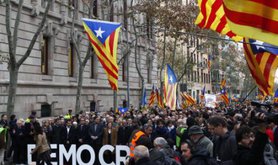
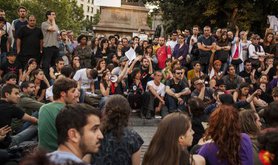


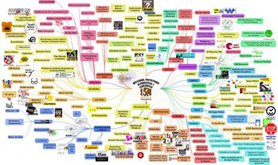
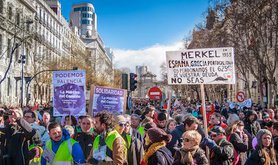
Comments
We encourage anyone to comment, please consult the oD commenting guidelines if you have any questions.